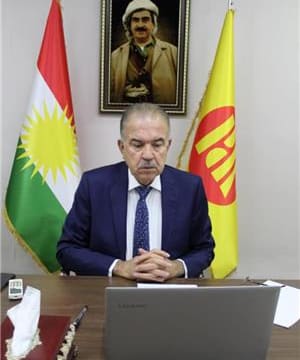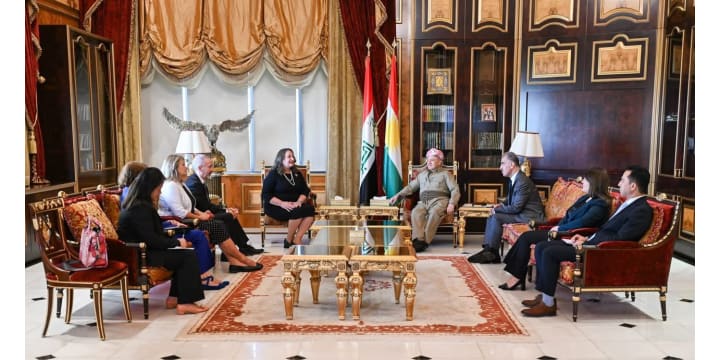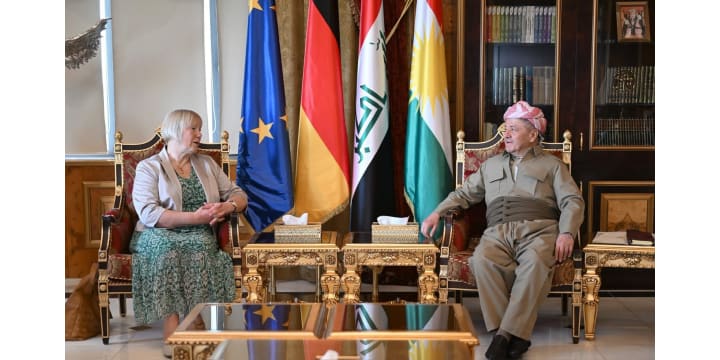
Achieving an inclusive economic recovery post COVID-19 in Iraq and the Kurdistan Region
2nd Special Video Conference on the COVID-19 Pandemic by ICCAP
Hoshyar Siwaily The Head of Kurdistan Democratic Party Foreign Relations Office's speech in the ICCAP Video Conference.
Hon. Jose de Venecia, Founder of the ICAPP and Co-chairman of the ICAPP Standing Committee
Hon. Cho Byung-jae, Secretary General of the ICAPP
Distinguished participants
Good Morning to you all from Erbil, Capital of the Kurdistan Region Of Iraq.
The economic and social disruption due to the spread of COVID-19 in Iraq including the Kurdistan Region has been profound. According to the World Bank, the country has experienced the largest contraction of its economy since 2003 and a contraction of the country’s GDP bymore than 10% in 2020. The impact of the pandemic on human lives and wellbeing has been tremendous withnearly1.20 million infected cases and over 16,000 deaths. In the Kurdistan Region, the impacted figures include more than 164,000infected and more than 4,000 deaths.
As Iraq is nearly dependent on oil revenues, the collapse of oil prices in 2020, coupled with measures introduced by the government to control the spread of the virus, created conditions for a deep recession with a significant impact on the lives and livelihoods of millions of people.
The Kurdistan Region was no exception. The reduction in oil revenues, restrictions on border crossings and trade and the reduction in revenues from the tourism industry have all contributed to creating a situation where low-income citizens facedreal hardships and challenges to their livelihoods. Although the Kurdistan Regional Government was not able to provide economic stimulus packages, it nevertheless, put a programme together to assist low income familiesby providing cash aid and food rations during the first few months of the pandemic in 2020.
The economy and governance systemin Iraq were under enormous strain even before the COVID-19 crises due to political, security and structural challenges. The twin shock of the pandemic and drop in oil prices has increased the fragility of the country and made reforms and inclusive economic and social policies to address the increasing public dissatisfaction more urgent and crucial to the stability and prosperity of the state and its citizens.
To address some of the deep-rooted issues, the federal government formally adopted a white paper for economic and financial reform in October 2020. Which the minister of finance remarked,“It seeks to put Iraq’s economy on a path that allows the state to take appropriate steps in the future to develop it into a diversified and dynamic economy.” Some of the reforms awaited the approval of the 2021 budget by the Parliament. The passage of the budget law in late March paved the way to start implementing some of the reforms. But, as early federal elections are planned to be conducted in October 2021, it is more likely that the bulk of the reform program and policy recommendations outlined in the white paper will have to await the formation of the next government in Baghdad.
The Kurdistan Regional Government passed its own reform law on 16January2020, to tackle a number of serious issues related to the overinflated public sector expenditure. The prime minister of the Region noted that the reform bill, “is an important step to transform the civil service, increasing transparency and creating a fair system for hardworking public sector employees.” The Regional Government has also introduced important measures to reform the tax system and organise the Region’s customs and trade at the border crossings as an initial attempt to diversify the economy and lessen the impact of fluctuating oil prices.
The Federal Iraq including the Kurdistan Region has to learn a number of important lessons from the recent crises. We only mention three lessons most relevant to us.
“Iraq can turn the pandemic crises into opportunity, diversify its economy away from the oil sector and sustain future growth.” This is what the World Bank recommended in September 2020 and has been reflected in the white paper.
Creative technology has been utilised during this pandemic not only to mitigate the adverse impact of the crises on lives and livelihoods, but also to advance the human experience to a new and unprecedented level. Iraq and the Kurdistan Region of Iraq can tap into the available natural and human resources and invest in new technologies.
As the US National Intelligence Council stated in their 2040 Global Trends on the COVID Factor: Expanding uncertainty, “COVID-19 has shaken long held assumptions about resilience and adaptation and created new uncertainties about the economy, governance, geopolitics and technology.” The world must be prepared to navigate in this future uncertain environment.
Our party, the Kurdistan Democratic Party, as a leading stakeholder in the Kurdistan Region and Iraq, has played a crucial role in the governance and politics of the Region and Iraq in the past. We are committed to encourage our governments and other political parties on the regional and federal levels to devise and support effective programs to lessen the impact of the pandemic and plan for futureinclusive development of our region and beyond.

